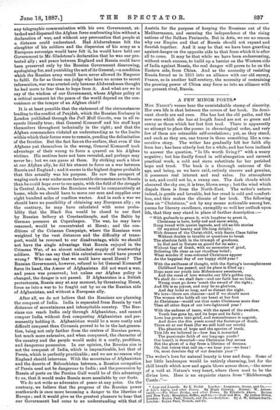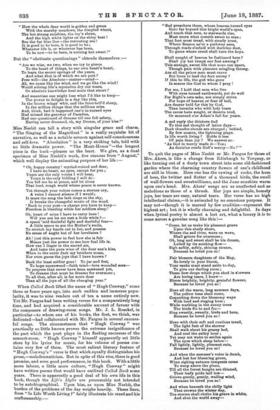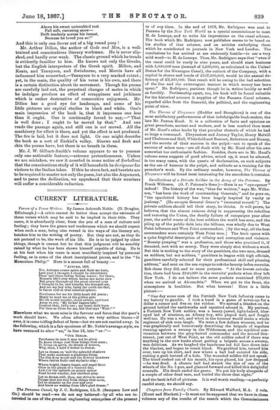A FEW MINOR POETS.*
MISS Names verses bear the unmistakable stamp of sincerity.
Her own life is shut between the covers of her book. Its domi- nant chords are sad ones. She has lost the old paths, and the new ones which she has at length found are not so green and sunny as those which her feet first trod. There is apparently no attempt to place the poems in chronological order, and very few of them are ostensible self-revelations; yet, as they stand,
and such as they are, one traces in them something like a con- secutive story. The writer has gradually felt her faith slip
from her ; has been utterly lost for a while, and has been inclined to answer the question, "Is life worth living ?" with a weary negative; but has finally found in self-abnegation and earnest practical work, a cold and stern substitute for her perished hope and trust. The book is a thorough outcome of the age, and being, as we have said, entirely sincere and genuine, it possesses real interest and real value. Its atmosphere is not, and could not be, a sunny one. The dark clouds which obscured the sky are, it is true, blown away ; but the wind which dispels them is from the North-East. The writer's nature: indeed, is gentle and loveable, but her creed is cold and comfort- less, and this makes the climate of her book. The following lines on "Christmas," not by any means noticeable among her, poems for literary excellence, exemplify so well her outlook upon life, that they may stand in place of further description :—
" With garlands to grace it, with laughter to greet it,
Christmas is here, holly-red and snow-white,
Hung round with quaint legends, and old-as-life :stories
Of mystical beauty and life-loug delight; With dreams of the Christ-child, with Santa Clans fables Without doubts to trouble or questions to break The absolute faith in the triumph of goodness, In God and in Natare on guard for its sake ; Without fear of death, with no memories of grief, Believing life clear as our cloudless belief ; What wonder if rose-coloured Christmas appear As the happiest day of our happy child-year ?
With the swiftness of thought, with the Spring's incompleteness Childhood has passed, and its place is filled up;
Hope sass our youth into Midsummer sweetness, And the roses of love wreathe our life's golden cap.
We shall do—we shall dare—and our faith has no limit, Wrong must go down 'neath the sword of the right; And life is so joyous, and may be so glorious, And day looks so long, and so distant the night.
We love—there are chances—and if we should meet The woman who holds all our heart at her feet At Christmas—would not that make Christmas more dear Than all other days of our love-lightened year ?
With the sadness of tears, with the speed of the swallow, Youth has gone by, and its hope and its faith ; Love has grown into grief, and remembrance is anguish, And down the dim years sound the footsteps of death.
There sit at our feast (for we still hold our revels) Tho phantom of hope and the spectre of truth.
This life we believed in—how has it rewarded The passionate faith of our long-ago youth ?
Our hearth is deserted—our Christmas Day seems Bet the ghost of a day from a lifetime of dreams.
Oh, lost voices that call us,—we hear you—we hear !
Oh, most desolate day of our desolate year !"
The writer's love for natural beauty is true and deep. Some of her little landscapes would be entirely charming, but for the chill breath which now and again blows across them,—the sense of a void at Nature's very heart, where there used to be the divine love. Here is an exquisite stanza from "Richborongh Castle :"— • Lays and Lrgends. By E. Nesbit. London Longman., Green, and Co.— A We's Idylls, and other Poems. By Hugh Conway. Bristol: W. Arrow- smith.—The Sam. Bridge, and other Poems. By Elisabeth Akers. Bolton and New Took: Houghton, Mifflin, and Co.—Gods and Mon. By Arthur Dillon. London : Kogan Paul, Trench, and Co.—SerGelloni. By J. W. GilbartBmith. London : Kagan Paul, Trench, and Co.
"How the whole dear world is golden and green With the marshy meadows, the dimpled wheat, The hot strong sunshine, the ivy's sheen, And the high white lights on the shiny beet ! See the far blue line—the retreating sea! It is good to be here, it is good to be ; Whatever life is, or whatever has been, To be now—to be here, is nothing but sweet !"
But the "obstinate questionings" obtrude themselves :-
"Are we wise, we two, when we try to pierce
To the heart of things, to our own heart's heart, To learn the secret springs of the years, And what that is of which we are part?
Free will—the Absolute—matter—mind- Ab, we came like the wind, and we go like the wind!
Weald solving life's mysteries dry our tears, Or absolute knowledge heal scuds that smart ?
And meantime one might lose what I'd like to keep—
The power to delight in a day like thin In the brown wings' whir, and the faint-bell'd sheep, In the million things that the millions miss. And, think, had it happened one's in-turned eyes Had missed the gateway of Paradise, Had one questioned of dreams till one fell asleep Having never dreamed, oh, my Dream, of your kiss !"
Miss Nesbit can tell a story with singular grace and charm. "The Singing of the Magnificat " is a really exquisite bit oI narrative, as well as a notable sermon against self-consciousness
and self-love. "Absolution" is a very striking tale, told with no little dramatic power. "The Moat-House "—the longest piece in the book—pleases us the least. We give, as a final specimen of Miss Nesbit's work, five stanzas from "August," which well display the animating purpose of her life :—
" Oh, happy country ! myriad-voiced and dear,
I have no heart, no eyes, except for you ; Yours are the only voices I will hear, Yours is the only bidding I will do Yon bid me be at peace, and let alone That loud, rough world where peace is never known.
Yet through your voices comes a sterner cry, A voice I cannot silence if I would; It mars the song the lark sings to the sky, It breaks the changeful mask; of the wood, 'Back to your post—a charge you have to keep— Freedom is bleeding while her soldiers sleep.'
Oh, heart of mine I have to carry here ! Will you not let me rest a little while ?- A space 'mid doubtful fight and doubtful fear— A little space to see the Mother's smile, To stretch my hands out to her, and possess No sense of aught bet of her loveliness ?
Ah ! just this power to feel how she is fair Means just the power to see how foul life is. How can I linger in the sacred air, And taste the pure wine of the dear sun's kiss, When in the outer dark my brothers moan, Nor even guess the joys that I have known ?
Back the least soldier goes ! To jar and fret,
To hope noes-owned—faith tried—love wounded sore—
To prayers that never have been answered yet, To dreams that must be dreams for evermore ; To all that, after all, is far more dear Than all the joys of all the changing year."
When Called Back lifted the name of "Hugh Conway," some three or fours years ago, into snob sudden and immense popu- larity, it was to nine readers out of ten a name entirely new. Yet Mr. Fergus had been writing verses for a comparatively long time, and had acquired a considerable amount of favour with the composers of drawing-room songs. Mr. J. L. Roeckel, in particularto whom one of his books, the first, we think, was dedicated—had collaborated with Mr. Fergus in several success- ful songs. The circumstance that "Hugh Conway" was practically so little known proves the extreme insignificance of the part which the poet plays in the fleeting successes of the concert-room. "Hugh Conway" himself apparently set little store by his lyrics for music, for his volume of poems con- tains very few of them. The most salient literary feature of "Hugh Conway's" verse is that which equally distinguishes his prose,—melodramaticism. But in spite of this vice, there is good promise, and even good performance, in this book. With a little more labour, a little more culture, "Hugh Conway" might have written poems that would have outlived Called Back some years. There is apparently a good deal of his own life in this Book, though the Life's ldylla are presumably not intended to be autobiographical. Upon him, as upon Miss Nesbit, the burden of the problems of the day weighs heavily. These lines, Irons "Is Life Worth Living I" fairly illustrate his creed and his craftsmanship:—
" Sad preachers those, whose heaven-turned eyes Gaze far beyond this bright world's span, And teach that men, to starwards rise, Must scorn what cometh sweet to man ; That feet mast tread, with steady trust, Where Reason ne'er a pathway sees, Through roads o'erlaid with doctrine dust, To gates where creed shall turn the keys.
Shall nought of heaven be fashioned here P Shall joy but tempt our feet awrong This strange, sweet life that none can spare, Though pain with pleasure mingling throng. Are all the prises men most crave But lures to lead the feet astray If this be life, the god who gave Is scarce the God to whom I pray !
For me, I hold that men who live With eyes turned earthwards, yet do well For Right's own sake, nor simply strive For hope of heaven or fear of bell, Are dearer held for this by God, Than hermits who with holy tears The eaves have sought, or deserts trod, Or mourned o'er Adam's fall for years.
A sad reply the thinkers find To this sad thought of latter days— Dark thunder-clouds are charged; behind, By few unseen, the lightning plays. Is life worth living ? Holds it less Of pain than joy ? We answer so : .As God in mercy made it—Yes; As doctrine reads God's mercy—No !'"
To quit the pages of Miss Nesbit or Mr. Fugue for those of Mrs. Akers, is like a change from Edinburgh to Torquay, or like turning out of a dusty town street into some old-fashioned garden where the charming country flowers of one's childhood are still in bloom. Here one has the cawing of rooks, the hum of bees, the twitter and flutter of a thousand birds, the smell of wall-flowers and sweetwilliams, and the June sunshine warm upon one's head. Mrs. Akers' songs are as unaffected and as melodious as those of a thrush. Her joys are simple, homely joys, her tears are easy, natural tears. Her verse has no high intellectual claims,—it is animated by no conscious purpose. It may not—though it is marred by few crudities—represent the highest art ; but it is wholly charming and delightful. In days when lyrical poetry is almost a lost art, what a luxury it is to come across a genuine song like this !— "Come, let us make his pleasant grave Upon this shady shore,
Where the sad river, wave on wave, Shall grieve for evermore ; Oh, long and sweet shall be his dream,
Lulled by its soothing flow— Sigh softly, softly, shining stream,
Because he loved you so !
Fair blossom daughters of the May, So lovely in your bloom, Your ranks must stand aside today, To give oar darling room ; These dew-drops which you shed in showers
Are loving tears, I know—
Bloom brightly, brightly, grateful flowers, Because he loved you so !
Here all the warm, long summer days, The yellow bees shall come, Coquetting down the blossomy ways With loud and ringing hum; While warbling in the sunny trees
The birds ditto and fro—
Sing sweetly, sweetly, birds and bees, Because he loved you so !
Here with their soft and cautious tread, The light feet of the shower Shall walk about his grassy bed, And cool the sultry boor; Yet may not wake to smiles again The eyes which sleep below— Fall lightly, lightly, pleasant rain, Because he loved you so!
And when the summer's voice is dumb, And lost her blooming grace, When sighing autumn tempests come To weep above the place,
Till all the forest boughs are thinned, Their leafy pride laid low—
Grieve gently, gently, walling wind, Because beloved you so!
And when beneath the chilly light That crowns the winter day,
The storms shall clothe his grave in white, And shut the world away- Above his sweet untroubled rest Fall soft, caressing snow—
Drift tenderly across his breast, Because he loved you so!"
And this is only one flower out of a big round posy !
Mr. Arthur Dillon, the author of Gods and Men, is a well- trained and conscientious literary workman. He is never slip- shod, and hardly ever weak. The classic ground which he treads is evidently familiar to him. He knows not only the Greeks, but the English interpreters of the Greek spirit. Milton, and Keats, and Tennyson, and Swinburne, and Morris have all influenced him somewhat,—Tennyson to a very marked extent ; yet, in the main, the quality of his verse is his own, and there is a certain distinction about its movement. Though his poems are carefully laid out, the perpetual changes of metre in which he indulges produce an effect of scrappiness and jerkiness which is rather destructive of consecutive enjoyment. Mr. Dillon has a good eye for landscape, and some of his little pictures are capital studies in black and white. One's main impression of the book is, that it impresses one less than it ought. One is continually forced to say,—" That is well done ; I ought to be moved by that." And one reads the passage again, and still one is not moved. All the machinery for effect is there, and yet the effect is not produced. The fire is laid, but it does not light. Or one might describe the book as a sort of Ezekiel's valley. Sinews and flesh and skin the poems have, but there is no breath in them.
Mr. J. W. Gilbart-Smith's volume appears to no to possess only one noticeable feature,—extreme pretentiousness. Unless we are mistaken, we saw it asserted in some notice of Serbelloni that the conscientious study of it will henceforth be de rigueur for visitors to the Italian lakes. If this be stern fact, and tourists are to be required to master not only the poem, but also the Argument, and to parse the dedication, we apprehend that their numbers will suffer a considerable reduction.




































 Previous page
Previous page